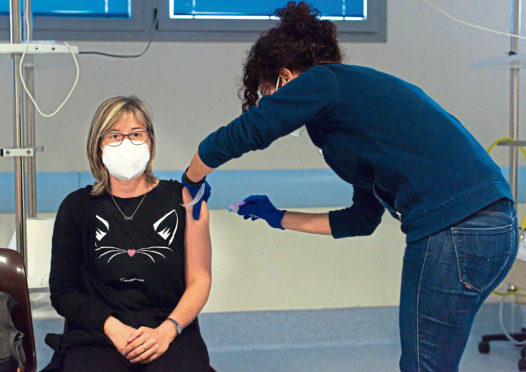Lucky politicians are the ones their opponents fear most. Right now fortune appears to favour Douglas Ross and the Scottish Conservatives ahead of the Holyrood elections.
They may have failed to knock over Nicola Sturgeon this week. But a bigger problem for them has always been the PM, not the FM. And they are successfully wrestling the lid on to Boris Johnson. Westminster is finally coming good for the Scottish Tories.
Just a few weeks ago Ross and his team were cringeing as they thought through how to deploy the PM in the upcoming campaign. They’ve yet to deny that plans included hiring a lot of Scottish extras to populate a disused army base somewhere and tell him he was in Glenrothes. Anything to keep him away from the Scottish electorate.
But two things have fundamentally altered that plan. First, the vaccine. Previously, to many Scots voters, Westminster was a faraway place full of entirely alien characters like Jacob Rees Mogg obsessed with statues and Manchester. Now it’s where the Covid vaccine comes from.
Last autumn, Downing Street was planning to stick tiny Union Flags on every vial of vaccine. Turns out they didn’t need to go that far. Westminster has plainly played a blinder on vaccine procurement. At least in part that’s because it had little to do with the politicians. Instead they stepped back, put an expert in charge and threw money at the problem. Funnily enough, that’s a tactic that works. And one that all parties ought to consider with regard to any given policy.
Wherever you are in the country the impression is that being part of the UK has been helpful when it comes to vaccine rollout. And, crucially, being out of the EU has also been a boon. (Albeit that alone does not make the case for Brexit, as some of the Leave brigade are claiming, as if in 2016 they foresaw a global pandemic coming down the track and their response was not to go scrub every bat in Wuhan but to distract the nation from getting organised with a tortuous exit from the EU.)
The SNP pitch – to be a small independent nation within the EU – has its appeal, but it doesn’t stack up in the face of Covid. Hence the polls swinging back towards No on the question of independence.
The Scots Tory leadership deserves some credit for never dallying with anti-Westminster schtick. Douglas Ross and his team have tried to position their operation as separate to that of their English counterparts, but it’s Boris Johnson they’ve sought to keep at arms length not the institutions or constitutional leadership of London. How could they when Ross will arrive in Holyrood fresh from Westminster in May while his interim stand-in, Ruth Davidson, will take the train in the other direction to join the House of Lords?
Ross will also retain his seat in the House of Commons, a human manifestation of the mantra that Scotland has two parliaments. For all the SNP’s sniping that he ought to quit the Commons forthwith, the inconvenient truth is that Alex Salmond kept his Westminster seat while he was first minister after 2007. But then, Alex Salmond is increasingly inconvenient to the SNP on a great many levels.
So the presence of the vaccine is boosting the Tory campaign. The other factor in their favour is the absence of Boris Johnson.
Remarkably, the word from Downing Street is that the man who always wants to be loved – to the extent he spent nine months of 2020 dodging delivering bad news in favour of making metaphors about Mexican hats (anyone remember “squash the sombrero”?) and dishing out half price dinners – has given up his pursuit of the Scots. I’m told he’s ‘made his peace’ with the fact most Scots don’t like him.
Bear that in mind the next time the English commentariat describe him as the Heineken politician that can reach the parts others can’t. There’s at least one part of the UK impervious to his appeal.
Another word regularly attached to the PM is ‘irrepressible’. And that is an aspect the Scottish Tories need to be wary of. They may have a problem if the two elements currently in their favour get confused. If the vaccine rollout continues successfully will the PM decide it also inoculates Scots from regarding him as a tiresome buffoon? The SNP will accuse of him of being feart come the election campaign in an effort to goad him into a visit. Ego pricked by the Nationalists, will he decide to weigh in on the campaign?
The Scots Tories are desperately hoping their own PM will stay away and when it comes to fuelling Conservative chances in Scotland he’ll let the vaccine take the strain.
James Millar is a political commentator and author and a former Westminster correspondent for The Sunday Post.

